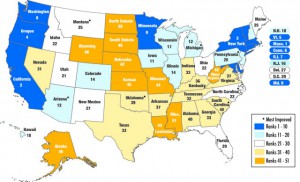
A new report from the American Council for an Energy-Efficient Economy explores the next generation of energy efficiency. Each year, the council releases a state scorecard ranking states based on energy efficiency policy and programs. Graphic from ACEEE
After combing through the American Council for an Energy-Efficient Economy’s far-reaching report, Frontiers of Energy Efficiency: Next Generation Programs Reach for High Energy Savings, it would be hard not to have high hopes for a more efficient future.
Surveying 22 residential, commercial and industrial energy savings programs, the Frontiers of Energy Efficiency report estimates that advances in energy efficiency could reduce forecasted electricity use by as much as 27 percent by 2030.
“Natural gas isn’t the only abundant energy resource in this country — we’ve also discovered deep reservoirs of energy efficiency,” Dan York, ACEEE utilities program director, and lead-author of the report says. “Even as tried and true energy efficiency measures become commonplace, we continue to dig deeper and find new technologies and practices plus new program approaches to unlock further opportunities to achieve large energy savings.”
The Frontiers of Energy Efficiency report is targeted to anyone who is looking to save money by using less energy, especially homeowners and small businesses. But it also provides some strategy tips for energy efficiency programs vying for new customers in traditionally difficult to reach markets. Although some programs and initiatives have been around for 30 years, ACEEE says that during the past decade energy efficiency programs have grown at an unprecedented rate because of policies that establish high, specific energy savings targets.
Through the development and market-saturation of high performance products ranging from LED lighting to high-efficiency washing machines finding ways to save energy will be easier and more affordable as technology advances — the group says that a common thread of next generation efficiency programs is high performance. But while more efficient electronics and home appliances represent savings opportunities for all types of customers, the report finds that the greatest potential exists in renovations and retrofits of homes and commercial buildings.
In addition to retrofits, innovative smart meters and home displays are changing the way consumers think about their energy use. While they may not save money or improve energy efficiency on their own, smart meters can motivate behavior change — another key frontier in achieving energy savings.
Still, many state policies favor fossil fuel interests, sometimes further delaying the next generation programs described in the report. In Appalachia and across the Southeast, Appalachian Voices will continue working to advance legislation and grow public support for programs that will bring us closer to the frontiers of energy efficiency.
Check out the full report here and see how your state ranks on ACEEE’s 2012 State Energy Efficiency Scorecard.



Leave a Reply